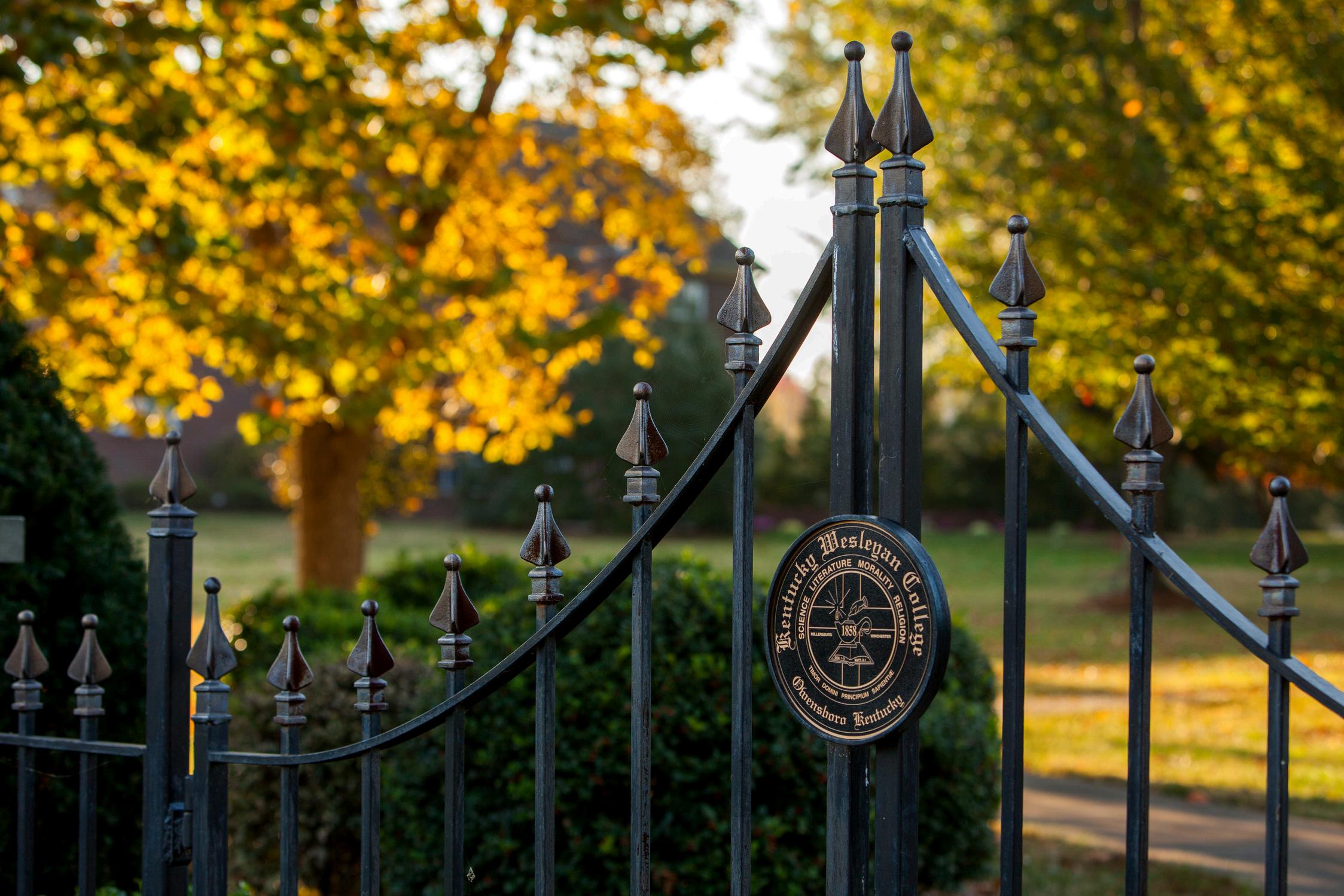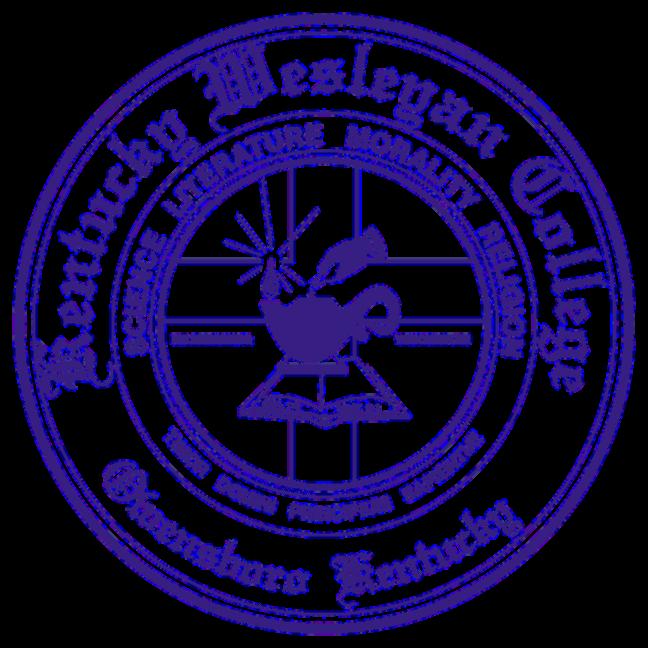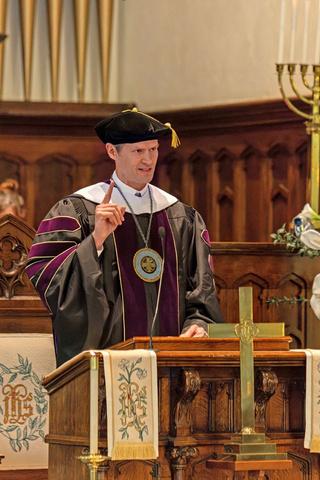






James P. Cousins, Ph.D.
Inaugurations give us a time to come together and reflect on our past as we think about the road ahead. Kentucky Wesleyan, along with Lindsey Wilson College and Union Commonwealth University, represent the fulfilled dream for Kentucky’s Annual Methodist Conference. The Conference’s support of these three colleges was critical early on. But over the decades that support expressed in donated dollars could not keep pace with the rising costs of higher education.
When Bishop W.T. Watkins addressed Kentucky’s Annual Conference about the situation in 1951, he stated blandly, "We have trough enough for one horse and three are trying to eat [from] that trough." In the decades since, our three colleges have had to stand up on their own,
developing plans, and models, and strategies allowing them to take on a greater share of the expense. Those of us who work, or have worked at Kentucky Wesleyan, or know someone who has, understand that this work comes with a healthy dose of personal sacrifice.
Over the years, the weight of sacrifice has increased to counterbalance an everwidening budget gap. This isn’t a unique digression in the history of higher education, though it does set up a conversation on our unique challenge
Lucerna [Latin]: lamp, light
The great seal of the College contains a lamp, symbolizing the pursuit of learning and continuance of knowledge, the ongoing process of acquiring, applying and sharing scholarship.
Editor: Katherine Rutherman krutherman@kwc.edu
Art Director: Jaimie Moore ’12
and charge. And that’s what I’d like to explore today.

All of higher education runs uphill against strong headwinds. It’s almost certain that there will never be as many colleges and universities as there are today. Historians will remember this as a time much like the antebellum era when hundreds of colleges and universities blinked into and out of existence. The rage for college making in the early 19th century seems as dramatic as market-driven corrections of the 21st.
We’ve learned from the ancients that flourishing arises from resilience born of a disciplined body and mind.
Academically
Adrift, A Perfect Mess, Declining by Degrees, Coddling and Close[ing] the American Mind Excellent Sheep
But America’s small colleges have seen the most correcting; 160 have ceased operations since the year 2000. Hundreds more have significantly curtailed operations or raided endowments in the exhausting pursuit of more and less. I’m usually the first person people message when a school enters the news cycle for the wrong reasons and I get a lot of these messages. But for what follows, consider the foregoing as acute symptoms instantiated by a chronic condition. America’s small colleges have, by and large, lost touch with their soul. Without the soul, colleges are, as generations of authors have now argued: Academically Adrift, A Perfect Mess, Declin while producing only Excellen the purpose of higher educati the most obvious but forgotten priori responsibility for flouri or promotional literature. A c its curriculum. But a colleg thinking, and acting with urg making. It regards flourishing By reducing education t colleges have hollowed out th makes them work or worthy o almost self-evident outcomes. necessary. It is the state or pr quality we embody and a pote the pursuit of human flourish
We’ve learned from the disciplined body and mind. W but also temperance, honesty instinctual second nature. S becomes healthier, our standa

and our constitutions more resi impossible and unknown calamities.

When the Founders wrote of “the pursuit of happiness,” they were gesturing toward something deeper than pleasure. They understood happiness as the freedom to seek meaning, through virtue, self-governance, and moral purpose. A government, they argued, is just and virtuous to the extent to which it protects that search, and liberty is only liberty when ordered toward the good. In that context, flourishing is not a luxury; it is the outcome of freedom rightly used. So, when we pursue human flourishing, we act in selfdefense of our own personal freedoms and the broader civic conditions sustaining our democracy.
Decades after our country’s founding, after it scaled to unfamiliar dimensions, French traveler Alexis De Tocqueville worried that the American experiment was failing. That greed, inspired by a culture of unrestricted competition, would eventually crowd out virtue and ultimately destroy “Democracy in America.” American transcendentalists found the antidote to materialism in a return to human flourishing. And flourishing, they argued, required us to strip our lives down to essentials. So, when we pursue human flourishing, we deliberately restore purpose, anchoring ourselves in the essential, the meaningful, the enduring. These ideas were breathed into higher education through the liberal arts. The liberal (or free) pursuit of inquiry and growth gives learners both the freedom and the discipline to shape a virtuous life of purpose.
But in the early decades of the 20th century, land grant universities shifted emphasis away from these pursuits and toward specializations and sub-specializations. In the end, America was left with something economist Thorstein Veblen warned us about and former University of California President Clark Kerr helped us recognize: a research-first, government-funded, vocational thing, entangled with corporate and political interests; a “multiversity,” a “mechanism” largely unknown to itself, as Kerr would say: “[united] by administrative rules and powered by money. ” He would go on to write, “I have sometimes thought of it as a series of individual faculty entrepreneurs held together by a common grievance over parking.”
All of higher education was shaped by the multiversity. Ph.D.’s trained in multiversities carried those norms with them to regional public universities and large and small private colleges alike. Under this climate of conformity, status came to depend on how closely institutions emulated the multiversity, often at the expense of their core beliefs, chief among them being human flourishing.
America’s small colleges falter and fail when that core principle works its way toward the edge and then out of the institution. I’m not just speaking of check-box electives, or disciplinary silos, but the presumption that flourishing can be found within an uncontested framework of transactionalism that reduces all of education to an exchange of credits for credentials, gamifies prestige, geofences, targets, segments, funnels, and finds mission in whatever’s most expedient.



All of these are features of the multiversity, and all of them have intruded into the life of America’s small colleges. Mimicry has pulled small colleges apart, fracturing them, leaving a husk of ceremonies and priorities representing something only vaguely familiar. Commencements now recognize survival instead of transformation; awards promote a hollow hunger for praise instead of qualities that signify the beautiful or noble.
In terms linguistic anthropologists would recognize, there is a “forest of symbols,” but without an emphasis on human flourishing, colleges are lost in the wilderness. And in that wilderness, students share common spaces but not values. The search for individual purpose wanes, collective responsibility atrophies and the formative parts of student life erode and are replaced by oppositional subcultures. Campuses grows a little colder, a little less personal, and a lot more reliant on gimmickry to hold things together. But more than this, without a commitment to human flourishing, colleges are, at their best ornamentation, at their worst, sources of feckless reactivity. Let me explain.
Just as human flourishing was edged out of the academy so too were small colleges separated from the communities they once served. For much of our country’s history, America’s small towns and big cities were the axis for the life of the mind where academics, dilettantes, and the curious all exchanged ideas that benefited everyone. Towns chartered colleges to ensure intellectual growth was long lived. In places marked out by limited access to formal education, networks of learning headed by colleges spread an enthusiasm for education and a culture of self-improvement. The college acted as a neighbor and a convener, embedding itself in the rhythms of civic life and moral imagination. It was common for the most important public events to be hosted on college grounds or in college buildings because colleges represented the culmination of a town’s potential.
They reinforced a community’s best and highest aspirations, tied them together, and symbolized a permanent civilizing force clawed back from the frontier. There was promise and potential in a small college but also comfort in knowing that future generations, and the leaders of those generations, were homegrown.
Most importantly, colleges helped bring polarizing issues to the town’s square where they were processed openly. Disagreements in the community were inevitable but manageable, because participants were neighbors first and opponents second. In this way, the college was neutral ground ensuring, reinforcing, and practicing the essence of democracy.


But the fortunes of America’s s ged dramatically in the early 20th century when disciplines m essional class disassociated expertise from public culture. Vigorous public discourse was replaced by an enigmatic unilateral dialogue exclusive to a distinct scholarly cast that drew away from the world and into itself. By aligning their ambitions with transactional norms and methods of multiversities, America’s small colleges unwittingly divorced themselves from their true missions as well as their communities. As colleges embraced conformity, prioritizing standardized credentials over personal growth and public transformation, they traded away their distinct identities and diminished their practical value. Instead of acting as forums where diverse ideas were tested and refined through vigorous democratic exchange, they became echo chambers. And in surrendering the tension and dynamism of real debate, they set into motion their own slow, painful decline.
Kentucky Wesleyan prevailed through seasons of doubt and will prevail because of its commitment to human flourishing. Throughout its long history, Wesleyan’s story has been shaped by a shared belief in flourishing over transaction, preserving not just an institution but a purpose. On our academic seal, you’ll find a reference to Proverbs 9:10, which reminds us that wisdom begins with humility before God. This humility calls us to direct our hearts outward to serve, rather than retreat into abstract contemplation. Guided by this principle, Kentucky Wesleyan has embraced the real work of higher education, shaping lives through active engagement and purpose-driven service. Generations of those connected to the College have helped our students flourish and in that flourishing, the College rediscovers and reaffirms its founding mission: to serve our community as a partner in the common good. But our commitment to flourishing is uncommon because it involves more than a taught curriculum and because it invites everyone from within but especially from without into a process of formation―shaping, not just what a student knows but who they become. Formation happens when students aim their hearts at something higher, when they see the best versions of themselves and are convicted to the pursuit of that ideal. To us, formation means disrupting the hedonic treadmill that seeks pleasure in material possessions, to resist the urge of the urgent, and develop meaningful relationships, purposeful vocations, and a sense of belonging. Make no mistake, this is an expensive and time-consuming undertaking requiring thousands of hours of formal and informal mentorship for each student.
But the evidence of our impact is everywhere. It lies in the hearts of our students who remember the legacies of those who made their success possible it’s in the practical benchmarks of our record enrollment, record donor support, our enormous economic impact, and the quarter of our alumni who have chosen to make Daviess County their permanent home. Today, our College’s commitment to community flourishing can be seen in our formal partnerships and informal collaborations. Speakers, athletics, fine and performing arts, service learning, and volunteerism pull our campus out; partnerships, shared spaces, and shared commitments pull others in.
In the months and years ahead, we will take bold steps to enhance this work. New


undergraduate programs will expan underway in city offices and nonprofits, offering students not y p y opportunities to participate meaningfully in policy creation. Graduate programs, the first in our modern history, will extend our mission by helping working adults upskill and advance while growing personally, strengthening their families, communities, and churches.
We will surge ahead and expand across every modality, welcoming new matriculates as we push against the frontiers of access and innovation. Campus ministries will deepen our students’ spiritual formation and attract new students to a campus that affirms faith as an essential dimension of a life well lived. And we’ll unite campus and community through
On our academic seal, you’ll find a reference to Proverbs 9:10, which reminds us that wisdom begins with humility before God.
new amenities that will attract commerce, events activities and collaborations all designed to make Kentucky Wesleyan feel like Owensboro’s campus, which it is.
None of this will be easy because it shouldn’t be easy. But we will realize all the things the College has hoped for, dreamed for, and sacrificed for all these past decades because, like our forebearers, we are farsighted, because we are courageous, and because we know that fear is reserved for God, but “through God we can do all things.”
Farsighted, we will seize opportunities to serve and build and grow. Courage will compel us to confront pent-up antagonisms and push back against echo chambers and crisis-born antigens. And we will act fearlessly as we challenge our own assumptions about who we ought to be and embrace who we were meant to become. In short, Kentucky Wesleyan College will be the very model of what a small college today must be: resilient, soul certain, and indispensable to human flourishing.
I’ll end these remarks as my predecessors have, by asking for help. From its earliest days, our College has relied on extraordinary efforts from extraordinary people. Whether it was faculty who taught on half pay, Daviess County farmers who rallied for relocation, Methodist leaders who defended the College’s mission as essential to the common good, or its many, many benefactors who pledged family fortunes to help us bridge an ever-widening budgetary gap.
They did this with a certitude of the goal, but never the way. To paraphrase essayist Milan Kundera, they walked into a fog, creating the path as they stumbled and strode. With the benefit of hindsight, we see the path, we see the people, but not the fog. It’s our duty to walk through tomorrow’s fog with the same courage. Help us find our way not to the left, not to the right, but forward, forward ever. Help us stand firm to our commitments and convictions. And help us stay confident in those convictions knowing that God “who began

a good work in us will carry it to c God bless you and may God forever bless Kentucky Wesleyan C


James P. Cousins, Ph.D., became president of Kentucky Wesleyan College on July 1, 2024, after serving as the provost and vice president of academic affairs since 2021. He has a distinguished career in higher education, including faculty and administrative leadership positions.
After beginning his career as a history and Latin teacher at Millersburg Military Institute in Millersburg, Ky., Dr. Cousins held teaching appointments at Kentucky State University, Berea College, Eastern Kentucky University and the University of Kentucky. Prior to his arrival at Kentucky Wesleyan, Cousins was associate dean in the College of Arts and Sciences at Western Michigan University, overseeing student success, faculty engagement and assessment and curriculum development. He had previously served as a faculty member and director of undergraduate studies in the university’s Department of History.
An historian specializing in the Early American Republic, Dr. Cousins has presented at dozens of national conferences and, in addition to two books, has published scores of articles, essays, reviews and translations in popular journals.
He has been recognized for many career accomplishments, highlighted by fellowships and awards including the American Council on Education Fellowship, the University of Chicago’s Robert L. Platzman Memorial Fellowship, the Filson Historical Society’s Research Fellowship, the Kentucky Historical Society’s Scholarly Research Fellowship, and a Scholar in Residence appointment at Transylvania University. Dr. Cousins earned his bachelor’s degree from Ohio State University and both his M.A. and Ph.D. from the University of Kentucky.


OfficeofExternalRelations

To make a gift to Kentucky Wesleyan College, scan the QR code, visit kwc.edu/give or mail a check to:
Office of External Relations
Kentucky Wesleyan College 3000 Frederica St. Owensboro, KY 42301